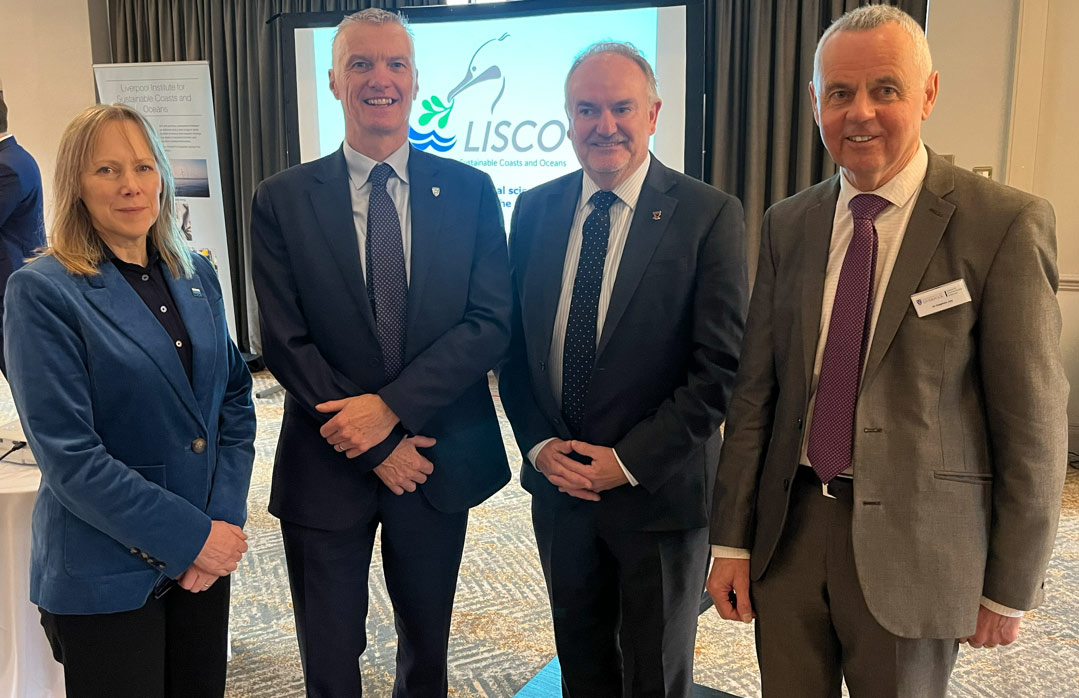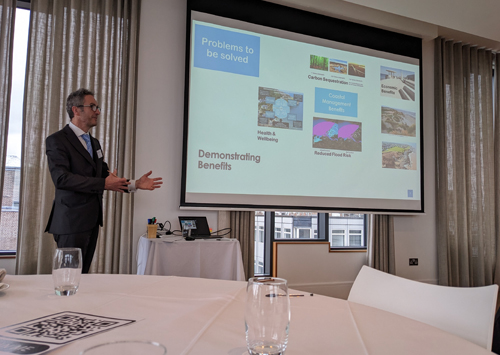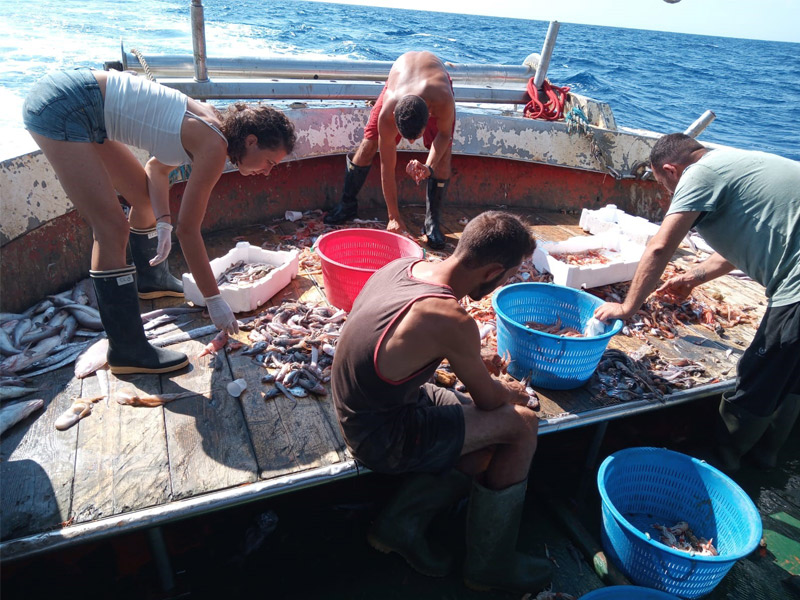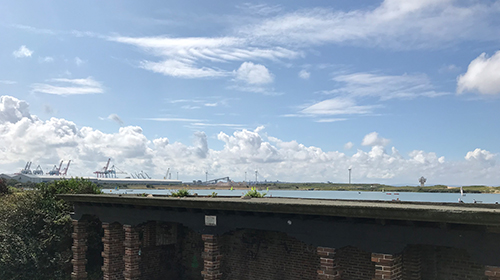News & Events

Liverpool is one of the UK’s biggest ports, thriving at its location on the River Mersey within a major estuary system – connecting this coastal region with the world. Today, it’s a city and region that is driving a vision for a net zero maritime future.
This vision was set out at LISCO’s Maritime Contribution to Net Zero event in Liverpool on November 14.
The importance and value of collaboration, across research, industry and government, including the city region, was set out by all the speakers: Vice Chancellors of the University of Liverpool, Prof Tim Jones, and Liverpool John Moores University, Prof Mark Power, Chief Scientific Officer of the National Oceanography Centre, Prof Penny Holliday, and then by Ms Alex Cousins, Connected Places Catapult, Dr Iris Cagatay, University of Liverpool, Prof Trung Thanh Nguyen, Liverpool John Moores University, Mr Richard Willis, Technical Director Port Operations & Technology, Maritime & Water, Royal Haskoning, Mr Steve Skelton, Interim Director of Policy & Strategy, Liverpool City Region Combined Authority, Mr Martin Olversen and Ms Jucilla Walters, NatPower Marine, Ms Ruth Wood, CEO, Mersey Maritime, Prof John Bridgeman, University of Liverpool. The event was moderated by Dr Stephen Jay, Director of LISCO, and Dr Christos Kontovas, Reader in Sustainable Maritime Transportation and Logistics, Liverpool John Moores University.

A main focus of the event was the proposed Liverpool-Belfast Green Shipping Corridor, in which a lot of work has been done already into how to overcome policy, investment and technology hurdles, including developing and shortlisting potential pilot projects, along with the initiatives being taken by NatPower Marine in decarbonising the Irish Sea shipping network. This was supplemented by news on the new Centre for Doctoral Training in Net Zero Maritime Energy Solutions and overviews of the healthy state of Merseyside maritime industries and forward-looking city region policy.
Download the THE MARITIME CONTRIBUTION TO NET ZERO presentation
The North West Coastal Exchange workshop April 2023

The North West Coastal Exchange workshop, aimed to explore the availability of data in the Northwest region and how to build skills, knowledge, in the area to better understand coastal environments and optimize coastal management decisions.
The workshop included sessions on coastal science and national policy, regional needs and development, and discussions on training, knowledge, data, and the future of regional coastal collaboration. These sessions provided a platform for experts and participants to share insights and ideas.
Helen Jay from the National Trust presented on coastal science and national policy, while Carl Green from Wyre Council and Paul Wisse from Sefton Council led the session on regional needs and development. Following these sessions, there were two discussion sessions focusing on data use, social needs, collaboration, training and communication where participants shared their views on how best to manage coastal environments in the Northwest region.
Discussions focused on:
- future coastal management strategies in the region for resilient communities and nature recovery, including managed realignment and hold the line strategies;
- the potential offered by nature-based solutions to address the multitude of stakeholders and parties with an interest in coastal management;
- how to promote collaboration and coordination among different groups and stakeholders, which is essential for achieving sustainable coastal management, building trust, and promoting a risk management approach to hazards.
- opportunities and challenges in utilizing machine learning, AI, and new technologies for characterizing coastal behaviours and the need for ground truthing;
- the need for funding to support upskilling, resourcing, knowledge sharing, and long-term collaboration.
The workshop was funded by the NERC Cross-Disciplinary Research for Environmental Sciences Discovery allocated to University of Liverpool to “support academics and researchers to build expertise and agility to work across disciplinary boundaries within Discovery Science”. The workshop was organized and co-ordinate by Dr Charlotte Lyddon, Cammy Acosta-Ramirez, Dr Cai Bird, Graham Lymbery, Prof Andy Plater, Dr Jonny Higham, Dr Dani Aribas-Bel, and supported by LISCO.
Looking at fisheries impacts through nimble DNA-sampling tools - 27th April 2022
Authors: Stefano Mariani & Giulia Maiello
Marine biodiversity is being lost at a dramatic pace: fish stocks dwindle, habitats continue to be degraded, food webs are disrupted, and the warming climate is set to escalate possibly irreversible ecological change in many regions. How can we comprehensively assess the status of biodiversity across the vast expanses of the oceans and keep monitoring its fluctuations with adequate frequency and granularity, so that we can future-proof marine ecosystem functions and be prepared to devise appropriate management actions?
One recent innovation, environmental DNA (eDNA) analysis, has rapidly persuaded ecologists and conservationists alike that its application can solve many of the obstacles that typically restrains large scale biomonitoring endeavours at sea. Indeed, eDNA is universal, in that the DNA fragments retrieved to identify species are common to virtually every organism on earth, so the same “sampling tool” can be employed across the tree of life. This approach has the power to capture a greater number of species with less effort/investment than other, less versatile methods. It is also environmentally sustainable, as it does not require to kill, harm, chase or disturb animals.
Yet, like pretty much everything else, eDNA analysis also isn’t perfect. Standard sampling operations require trained staff and a laborious water filtering step. That’s why, one of our recent studies is promising to revolutionise the way eDNA is captured in aquatic environments. We designed a 3D-printable spherical sampler, named “metaprobe” (Fig. 1), which can be stuffed with gauze rolls and then deployed in the water for an extended period of time, so that, as it becomes soaked with water, it traps the trace DNA released by every organism that inhabits a given environment.

Fig.1 – From left to right: the 3D metaprobe design, the metaprobe being loaded with gauze rolls, the metaprobe placed in a trawl net, and last, gauze rolls placed in tubes and preservative ready to be transported to the lab. (Photo: ©G.Maiello)
A potentially game-changing scenario is the association of such a simple, low-effort sampling device with the activities of commercial trawlers. The spatial and temporal coverage of commercial fishing operations is collectively far greater than any scientific survey; thus, by equipping many trawlers with a number of metaprobes, scientists can obtain a far larger amount of data on marine biodiversity, within budgets and time frames that are orders of magnitude smaller than what would be achievable by any other means.
The metaprobe-based eDNA approach reliably captures the composition of the catches from different habitat types, as well as trapping the DNA of many pelagic fishes that typically elude the fishing gear, therefore yielding a more comprehensive portrayal of the ecological tapestry that supports fisheries and other ecosystem services. But there is more to it. This approach is proving to be a catalyst for a new, strengthened partnership among scientists, managers, and fisherfolk, whereby the latter become empowered with greater responsibility to carry out biodiversity monitoring, without disruptions to their livelihood, and a greater sense of participation in the protection of marine resources.

Fig. 2 – PhD candidate Giulia Maiello (left) while sorting the catches alongside commercial fishermen. (Photo: ©G.Maiello)
LISCO Involved Sustainable Management of UK Marine Resources (SMMR) Projects - 11 May 2022
LISCO partners are involved in two of the six projects to successfully gain funding from the Sustainable Management of UK Marine Resources (SMMR) programme of marine research, which aims to address critical gaps in understanding identified by UK policy makers.
The Co-benefit Solutions for Resilient Coasts (Co-Opt) project is being led by LISCO member Laurent Amoudry from the National Oceanography Centre, with the participation of other colleagues from NOC and the University of Liverpool. The project will deliver a new, integrated and interdisciplinary system-based framework that will effectively support the required transition from hard ‘grey’ defences to softer ‘green’ solutions in coastal and shoreline management. For more information visit: https://www.smmr.org.uk/funded-projects/co-benefit-solutions-for-resilient-coasts-co-opt/
The Integrating Diverse Values into Management will look at the many dimensions of value including economic values, social and cultural values, aesthetic values, and natural values, and how they might be accounted for in decision-making frameworks. Stephen Jay from the University of Liverpool is a co-investigator in the project. The overarching goal of this project is to generate a step-change in the transdisciplinary capability of the UK marine policy stakeholder and research community to implement diverse values into decision making. For more information visit: https://www.smmr.org.uk/funded-projects/integrating-diverse-values-into-management/
SimAtlantic Online Project Conference – 15th September 2021
The SIMAtlantic conference is a free online event on “Lessons from the European Atlantic for implementation of maritime spatial planning in transboundary contexts”. The aim of the conference is to share learning and best practice from the SIMAtlantic project and elsewhere around Europe, to assist in shaping future cooperation and coherence in maritime spatial planning (MSP).
The sessions are aimed at a wide audience from researchers to policymakers, practitioners and stakeholders, while including everyone who shares an interest in maritime spatial planning, particularly the benefits and challenges of transboundary working. Sessions will take place in English and are designed to facilitate discussion.
The conference is free to attend, and you can choose up to four sessions that interest you by following the link and registering (times are UK/Ireland time): https://www.simatlantic.eu/conference/
Shared Visions for Marine Planning: Insights from Israel, South Africa & the United Kingdom. Tues-Wed 9th-10th March 2021 .
LISCO is organising this online symposium in collaboration with Technion Israel Institute of Technology, and Nelson Mandela University, South Africa.
Please register here to join this event and receive the full programme: https://shortest.link/MSPSYMP
Virtual Day at the Beach - 1st May 2020
Fancy a Virtual Day at the Beach? 1st May 11:30-13:30 and/or 2nd May 12:30-14:30 Join us online to write a coastal community poem and build word clouds about your favourite coastal walks.
To take part in activities visit https://twitter.com/wirewall_noc for instructions starting 1st May from 11:00 and 2nd May 12:00. You don't need a twitter account.
#virtualbeach #beachpoem #coastalhazards #AGU100 #digitalscience&art
Crosby Coastal Walk
Through the coming together of science and the arts a narrated coastal walk along Crosby’s shoreline, north of Liverpool, has been created between Hall road and Waterloo train stations. This has been developed to raise awareness of shoreline change and coastal hazards. The poems capture changes in land use, coastal processes, shoreline management and observational techniques. By becoming more aware of changing coastal conditions we hope people will contribute to the Vision for Crosby’s Coastal Park.

Join us and download the GPS waypoints and MP3s from: http://noc.ac.uk/changing-shores-crosby or take a look at our video playlist: https://www.youtube.com/playlist?list=PLoYJVOchmO7HtiWLMwU8q6WLQcZ91prSf
Coffee-Time Discussion - 26th June 2019
Today we held a coffee-time discussion about the Blue-Green Energy Theme. 6 of the 12 people who are affiliated with this theme attended at NOC at 3:30pm today. We discussed the following topics:
- Getting people to sign up to LISCO and the theme
- Adding links to present and past projects
- Identifying activities to carry the theme forward
We agreed it was a useful conversation and we intend to repeat it in a few months.
Friends of Crosby Beach Marine Awareness Day – 18th May 2019
On Saturday the 18th of May LISCO representatives from the University of Liverpool and the National Oceanography Centre attended the Marine Awareness Day. Despite initial reports of rain the weather surprised us with what turned out to be a lovely sunny day. The event was a great success and members of the public were invited to discuss all things coastal with members of the team or get involved in the activities on offer. Members of the public had a chance to learn how the WireWall project can help obtain wave overtopping data using the latest technology to help develop site specific safety responses to inform flood risk response plans as well as calibrate and validate overtopping systems and models using a scaled down Lego version of the equipment and water pistols. There was also the opportunity to get involved in some skate and shark egg case identification with some samples collected from the area. There were a host of other interesting stands to visit including Greenpeace, Green Sefton, the RSPB and the RNLI to name but a few. It was a fantastic day and great fun for all who attended.
LISCO European Maritime Day Event – 13th May 2019
To mark the end of the first day of the Strategic Partnership for Marine Spatial Planning (MSP) Summer School and to celebrate European Maritime Day LISCO hosted an informal series of talks by LISCO members on some of our areas of research. Sue Kidd from the Department of Geography and Planning gave a talk on the ESPON funded INTERPLACE project which investigates how Land-Sea Interactions can be addressed by MSP. Marcelo Gomes from Earth, Ocean and Ecological Sciences presented his work on fish responses to environmental drivers in nearshore areas. Finally Lisa Eastwood from the National Oceanography Centre spoke about the WireWall project which by monitoring wave overtopping of flood defence can help to mitigate the impact of rising sea level on flood hazards. The event was attended by students from the University of Oldenburg (Germany), University of Nantes (France), Breda Institute for Applied Sciences (Netherlands), and the Leibniz Institute for Baltic Sea Research as well as LISCO members. The event was concluded with and opportunity for networking and some lively discussion.
The Ocean Tide and the Port of Liverpool – 11th May 2019
This engaging event held at the iconic Liverpool Maritime Museum was organised by the National Oceanography Centre (NOC) and the University of Liverpool, in association with the Centre for Port and Maritime History (University of Liverpool, Liverpool John Moores University and Merseyside Maritime Museum) and LISCO. The event marked the 100th Anniversary of the Liverpool Tidal Institute, which was founded at Liverpool University in 1919 and is now known as the National Oceanography Centre. The event was opened by Philip Woodworth of NOC who gave an introduction to the Ocean Tide and the Port of Liverpool as well as a brief history of the Liverpool Tidal Institute. This was followed by a series of talks, many from LISCO members who are experts in their field. Topics covered included tidal energy, the impact of tides on the banks of the Mersey and tides and the Earth’s climate. All of the presentations from the event can be found on the NOC website.